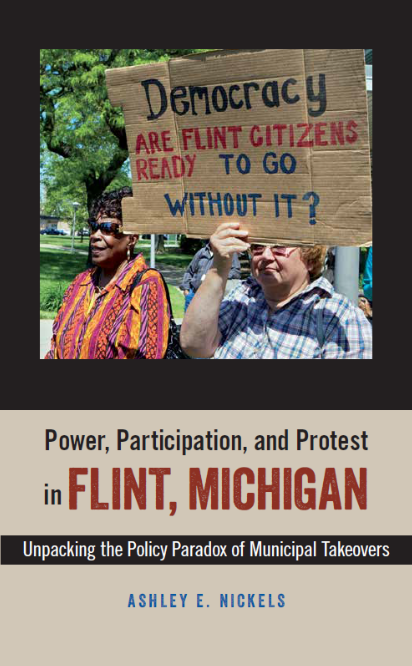Power, Participation, and Protest in Flint, Michigan: Unpacking the Policy Paradox of Municipal Takeover
When the 2011 municipal takeover in Flint, Michigan placed the city under state control, some supported the intervention while others saw it as an affront to democracy. Still others were ambivalent about what was supposed to be a temporary disruption. However, the city’s fiscal emergency soon became a public health emergency—the Flint Water Crisis—that captured international attention.
Awards
- American Society for Public Administration Section on Democracy and Social Justice Book Award, 2019
- American Political Science Association Robert A. Dahl Award, 2020
- Outstanding Academic Title, Choice, 2020
Unmasking Administrative Evil, 5th Edition (with Balfour & Adams)
The relationship between evil and public affairs, as well as other fields and professions in public life, has come to the fore as institutions of government seek new ways to operate in an environment of extreme mistrust. Unmasking Administrative Evil, 5th Edition argues that the tendency toward administrative evil, as manifested in acts of dehumanization and genocide, is deeply woven into the identity of public affairs. Indeed, ordinary people may simply act appropriately in their organizational role—in essence, just doing what those around them would agree they should be doing—and at the same time, participate in what a critical and reasonable observer, usually well after the fact, would call evil. Even worse, under conditions of moral inversion, ordinary people can all too easily engage in acts of administrative evil while believing that what they are doing is not only correct, but in fact, good. This 5th edition offers important updates, including
Laying the groundwork for a more ethical and democratic public life – one that recognizes its potential for evil, and avoids state-sponsored dehumanization and destruction – Unmasking Administrative Evil, 5th Edition is required reading for all students of administrative ethics and public service ethics, as well those in other administrative sciences.
Community Development and Public Administration Theory (with Jason Rivera)
he concept of community development is often misunderstood, holding different meanings across different academic disciplines. Moreover, the concept of community development has been historically abstracted, not only in the way the concept has been conceptualized in academic studies, but also by the way in which practitioners use the term in the vernacular. Departing from traditional definitions of community development, this volume applies the New Public Service (NPS) perspective of Public Administration to community development to illustrate how public administrators and public managers can engage in community development planning and implementation that results in more equitable and sustainable long-term outcomes.
This book will be of interest to practitioners and researchers in public administration/management, public administration theory, community development, economic development, urban sociology, urban politics, and urban planning.
Grand Rapids Grassroots: An Anthology (with Dani Vilella)
While Grand Rapids, Michigan is known for large-scale events like ArtPrize; major businesses like Meijer, Steelcase, and Amway; and the philanthropic and political contributions of its wealthiest residents, there are hundreds — if not thousands — of grassroots activists working day-in and day-out to make Grand Rapids what it is. This collection seeks to raise the voices of those individuals and grassroots groups. The editors have joined forces to compile articles, poetry, and personal narratives about and by the grassroots activists of Grand Rapids. Edited by Ashley E. Nickels and Dani Vilella, in this collection, readers will find first-hand stories about:
- The lasting effects of discrimination in the city’s Southeast community
- Disability advocacy and food justice
- Traversing the city on moped
- The furniture workers strike of 1911
A complex portrait of an American city in transition and the tireless work of activists to make it a wonderful, just place to live.
Feminist Pedagogy, Practice, and Activism (with Jennifer Martin & Martina Sharp-Grier)
Feminist programming, no matter the venue, provides opportunities for young girls and women, as well as men, to acquire leadership skills and the confidence to create sustainable social change. Offering a wide-ranging overview of different types of feminist engagement, the chapters in this volume challenge readers to critically examine accepted cultural norms both in and out of schools, and speak out about oppression and privilege. To understand the various pathways to feminism and feminist identity development, this collection brings together scholars from education, women’s studies, sociology, and community development to examine ways in which to integrate feminism and women’s studies into education through pedagogy, practice, and activism.




